Final report for YENC19-137
Project Information
This project introduces youth in Minneapolis to hoop house vegetable production. We will develop a decision case study highlighting an experienced winter hoop house spinach producer, an educational video produced collaboratively with youth, and a multi-day experiential learning trip to engage with hoop house production and local food markets. Materials and activities will be developed by Anne Pfeiffer, under the supervision of Dr. Grossman at the University of Minnesota and in conjunction with Youth Farm. Youth Farm is a leadership development program that utilizes food as a catalyst for social change and community engagement, with an emphasis on training through gardens and greenhouses. Outcomes include youth who are aware of hoop house production and the challenges and opportunities associated with careers in vegetable production.
- Increase youth critical thinking skills through a Decision Case Study presenting farmer experiences using hoop houses for vegetable production.
- Provide hands-on, experiential STEM education including concepts in soil science, entomology, biology, and engineering.
- Increase capacity of urban youth from diverse backgrounds to grow vegetable crops during the school-year via training in hoop house production.
- Introduce youth to opportunities for business and market development through season extension and high value horticultural crop production.
- Share project results with at least 3 additional urban high schools that have farms integrated into their curriculum.
Cooperators
- (Educator)
Educational & Outreach Activities
Participation Summary:
One of the primary outputs of this project as an education delegation to Madison WI to visit local food system sites in Southern WI in collaboration with Youth Farm, a Minneapolis based youth development non-profit focused on social change and agriculture. Participants included Youth Farm Program Coordinator Marcus Kar and four middle and high school students from backgrounds underrepresented in agriculture. Site visits included: baking trials related to a University of WI heritage wheat breeding program, Voss Organics, an urban high tunnel farm, Badger Rock School, an environmental and agriculture based public charter school, and Snug Haven Farm, which heavily uses high tunnels in their production of vegetables for their local market.
In conjunction with the Snug Haven site visit, a written case study and two videos were produced to provide lasting youth-targeted educational resources. Snug Haven farmers expressed most interest in developing a decision case based on the future of their family land and series of organically certified high tunnels, a 'true to life' decision that they would be facing in the coming years. The written case study "Deciding the Legacy of the Land," one of two developed educational videos, focuses on questions surrounding Snug Haven Farm's generational transition and questions of land ownership. The second video provides an overview of why and how high tunnels are used, targeted toward a level that will be appropriate for use in youth education programs. Two versions of the case study are available: the Student version for distribution to students, and 2) the Discussion Leader version, with questions at the end for instructor to use to guide the student discussion.
Outputs:
Snug Haven case study-land dilemma _student
Snug Haven case study-land dilemma _discussionleader
Transitioning Snug Haven Farm and High Tunnels Educational Video (5 minutes); with resources to transition a farm business at end of video:
https://drive.google.com/file/d/1-NWReoJ__UWR_dUBIyupKcS4kDWEqq5o/view?usp=sharing
Introduction to Growing Food in High Tunnels Educational Video (10 minutes):
https://drive.google.com/file/d/1B6GLJGm09y2yqlRaBaS9mB46x0gqEcgU/view?usp=sharing
Finally, this project involved University of Minnesota undergraduate students in the development of pilot teaching modules that could be utilized by urban schools providing agricultural education, in 2020 and 2021. A series of written teaching modules including agricultural demonstrations of interest to teachers in our region were developed, refined 2020, and middle and high schools with agriculture program contacted in 202o for distribution. The guides included a list of materials and instructions for four different demonstrations, including: 1) Crop Planning 3) Integrated Pest Management and Crop Scouting, 4) Phenology, 5) Record Keeping and Making Observations, and 6) Soil Formation, Structure and Ecology. The modules are targeted at an urban middle- to high-school audience and designed to provide information and provoke curiosity into different aspects of our food production system by being highly visual and interactive. Schools showing interest in the curriculum included Great River School, Roosevelt High School, Minneapolis Farm to School program, and St. Paul Public Schools garden program. Further development or piloting of the curriculum was not included in this project, but could be a future activity if interest is high.
Learning Outcomes
Students learned about high tunnel spinach production
Students learned about challenges farmers face in growing food to support their livlihoods
An educational 3d trip to visit Snug Haven Farm and other food systems sites in the Madison, WI area took place in March, 2020 with a group of students from Youth Farm in Minneapolis, MN. Youth Farm leaders reported "Youth farm gained a lot from this opportunity; it really put me in the mindset of being a lead/director on the ground in urban agriculture... to help youth that are a part of my programming really take ownership in spaces we are creating and learn about different ways to approach the problems." Youth reported having a better understanding of the biology of farming systems, how and why growers use high tunnels, and opportunities to develop profitable food and farming businesses.
Youth Farm leader Marcus Kar described the opportunities provided by the project in this way: "We are not here to be the adults in the room, to be the teacher, we are here as youth workers. We are here to get down to their level and learn side by side with them and allow them the energy and space to feel safe and absorbing energy as their own scientist. This is what SEL is all about – Social Emotional Learning. This is a huge part of stem and this is a source of where the idea of stem came from. Allowing kids to explore and touch and feel and become their own person."
The Madison experience was unfortunately the last in-person experience that we were able to host due to the covid-19 pandemic. A greater number of students were planning to visit high tunnel production sites in the Twin Cities, but these visits were cancelled. The video we produced as part of the project was made available to the Youth Farm students in lieu of these activities.
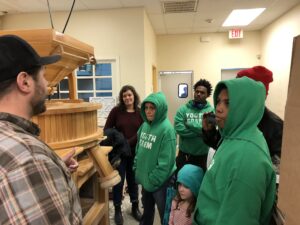
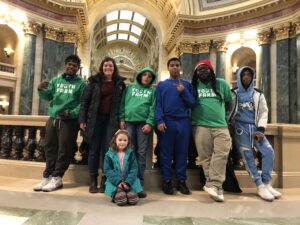
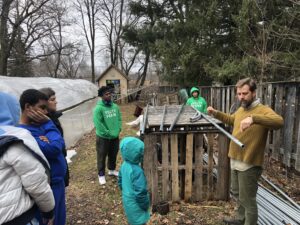
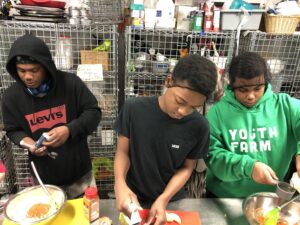
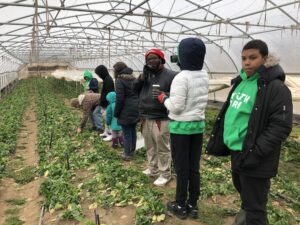
Project Outcomes
This project created new materials that high and middle schools can use to teach about sustainable agriculture (see Education and Outreach section).
It is likely that Youth Farm staff learned concepts related to high tunnel production, helping to support their own urban agriculture program in North Minneapolis. Schools receiving curriculum were not in session at the time of the active project due to covid-19, but have access to the curriculum for future classroom use.
The most successful part of our project was the tour to Madison WI with youth in the Youth Farm Minneapolis program. Evaluations with Youth Farm staff and students on the trip showed that we successfully inspired youth from a challenged part of Minneapolis to explore local foods from both a production and distribution perspective, with a focus on high tunnel production. The collaboration developed between UMN and Youth Farm was strengthened, and continues to stimulate us to consider future join efforts for youth education. One concrete example is that in summer 2022-2026 we will be working with Youth Farm in a 10-week summer program to introduce undergraduate students under-represented in agriculture to explore food systems research at UMN.
The most challenging was the outreach to schools. Schools that were initially enthusiastic about the development of our curriculum were challenged by covid-19. Secondarily, since teachers time is limited, and curriculum in schools is largely in place, the introduction of new materials that may fall outside existing programs is difficult to incorporate. We strongly suggest that new projects work with teachers first to identify gaps in their curriculum, and then develop the materials to fill those gaps. Thus, a component of a survey, or teacher interviews, prior to curriculum development, is warranted. Another concrete suggestion is to have teachers initiate the proposal concept, but suggest partnering with university staff that can assist with bringing their ideas to life through the project activities.